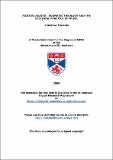Files in this item
Fides ex auditu: dogmatic theology and the ecclesial practice of music
Item metadata
| dc.contributor.advisor | Begbie, Jeremy | |
| dc.contributor.advisor | Elliott, Mark | |
| dc.contributor.advisor | Guthrie, Steven | |
| dc.contributor.author | Edwards, J. Andrew | |
| dc.coverage.spatial | 144 | en |
| dc.date.accessioned | 2008-05-28T11:30:50Z | |
| dc.date.available | 2008-05-28T11:30:50Z | |
| dc.date.issued | 2008-06-27 | |
| dc.identifier.uri | https://hdl.handle.net/10023/496 | |
| dc.description.abstract | Any consideration of the aural reception of Christian faith must take the ecclesial practice of music and its relation to the divine logos into account. Specifically, the logos provides normativity for such music, as the latter endeavours to proclaim that divine Word. Contemporary theological reflections on music are made difficult by the modern development of the concept of taste, which has culminated in a radicalized subjectivity that eschews normative criteria. A reclamation of the normative role of the logos is thus required in the dogmatic theology of music. Karl Barth’s theology is examined in order to establish the critical relation between proclamation and dogmatics. Barth’s praise of Mozart is reviewed to demonstrate how his detachment from a broader historical tradition confines him to a strictly formalist aesthetic that is unable to hear musical meaning. Further examination of his early writings reveal how his critical revelatory dialectic, vis-à-vis his reading of the Auftrag, prohibits a proclamatory role for the ecclesial practice of music. Pope Benedict XVI’s theology provides a fitting alternative, as his dogmatic reflections assume a necessarily kerygmatic role for music that Barth denies. In this Benedict is more in tune with the ancient Church Fathers. His dogmatic reflections on the “musified” logos are in dialectical tension with modern philosophies of music, as he espouses a Christian rationality over against modern secular/subjective reason. This dialectic is augmented with a comparison of Augustine and Kant on the practice of counting. Finally, contrary to some readings, the normativity of Benedict’s musical logos is not an oppressive force, hampering the freedom of musical performance. A “descriptive” method of dogmatic reflection is finally recommended, in which the theology of music approximates a kind of journalistic “music criticism,” albeit one that listens for the Word of Christ, the hearing of which brings faith (Romans 10:17). | en |
| dc.format.extent | 860330 bytes | |
| dc.format.mimetype | application/pdf | |
| dc.language.iso | en | en |
| dc.publisher | University of St Andrews | |
| dc.subject | Theology of music | en |
| dc.subject | Dogmatic method | en |
| dc.subject | Doctrine of the logos/Word of God | en |
| dc.subject | Ecclesial practices | en |
| dc.subject | Karl Barth | en |
| dc.subject | Pope Benedict XVI/Joseph Ratzinger | en |
| dc.subject.lcc | ML3921.2E3 | |
| dc.subject.lcsh | Music--Religious aspects--Christianity | en |
| dc.subject.lcsh | Theology, Doctrinal | en |
| dc.subject.lcsh | Word of God (Christian theology) | en |
| dc.subject.lcsh | Barth, Karl, 1886-1968--Contributions in doctrinal theology | en |
| dc.subject.lcsh | Benedict XVI, Pope, 1927- | en |
| dc.title | Fides ex auditu: dogmatic theology and the ecclesial practice of music | en |
| dc.type | Thesis | en |
| dc.type.qualificationlevel | Doctoral | en |
| dc.type.qualificationname | MPhil Master of Philosophy | en |
| dc.publisher.institution | The University of St Andrews | en |
| dc.publisher.department | Institute for Theology, Imagination and the Arts | en |
This item appears in the following Collection(s)
Items in the St Andrews Research Repository are protected by copyright, with all rights reserved, unless otherwise indicated.

